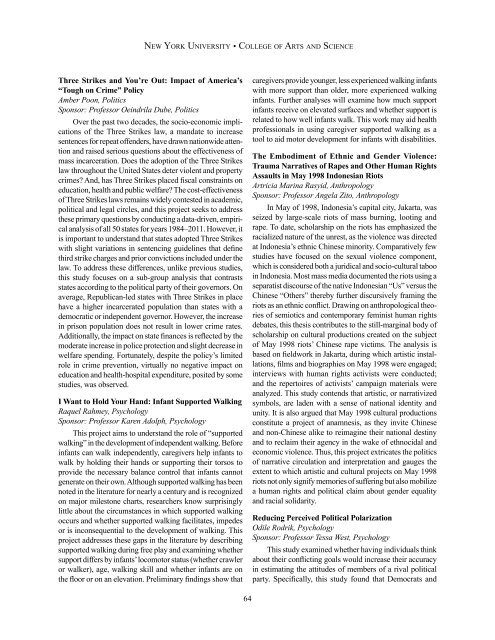INQUIRY
InquiryXIX
InquiryXIX
You also want an ePaper? Increase the reach of your titles
YUMPU automatically turns print PDFs into web optimized ePapers that Google loves.
New York University • College of Arts and Science<br />
Three Strikes and You’re Out: Impact of America’s<br />
“Tough on Crime” Policy<br />
Amber Poon, Politics<br />
Sponsor: Professor Oeindrila Dube, Politics<br />
Over the past two decades, the socio-economic implications<br />
of the Three Strikes law, a mandate to increase<br />
sentences for repeat offenders, have drawn nationwide attention<br />
and raised serious questions about the effectiveness of<br />
mass incarceration. Does the adoption of the Three Strikes<br />
law throughout the United States deter violent and property<br />
crimes? And, has Three Strikes placed fiscal constraints on<br />
education, health and public welfare? The cost-effectiveness<br />
of Three Strikes laws remains widely contested in academic,<br />
political and legal circles, and this project seeks to address<br />
these primary questions by conducting a data-driven, empirical<br />
analysis of all 50 states for years 1984–2011. However, it<br />
is important to understand that states adopted Three Strikes<br />
with slight variations in sentencing guidelines that define<br />
third strike charges and prior convictions included under the<br />
law. To address these differences, unlike previous studies,<br />
this study focuses on a sub-group analysis that contrasts<br />
states according to the political party of their governors. On<br />
average, Republican-led states with Three Strikes in place<br />
have a higher incarcerated population than states with a<br />
democratic or independent governor. However, the increase<br />
in prison population does not result in lower crime rates.<br />
Additionally, the impact on state finances is reflected by the<br />
moderate increase in police protection and slight decrease in<br />
welfare spending. Fortunately, despite the policy’s limited<br />
role in crime prevention, virtually no negative impact on<br />
education and health-hospital expenditure, posited by some<br />
studies, was observed.<br />
I Want to Hold Your Hand: Infant Supported Walking<br />
Raquel Rahmey, Psychology<br />
Sponsor: Professor Karen Adolph, Psychology<br />
This project aims to understand the role of “supported<br />
walking” in the development of independent walking. Before<br />
infants can walk independently, caregivers help infants to<br />
walk by holding their hands or supporting their torsos to<br />
provide the necessary balance control that infants cannot<br />
generate on their own. Although supported walking has been<br />
noted in the literature for nearly a century and is recognized<br />
on major milestone charts, researchers know surprisingly<br />
little about the circumstances in which supported walking<br />
occurs and whether supported walking facilitates, impedes<br />
or is inconsequential to the development of walking. This<br />
project addresses these gaps in the literature by describing<br />
supported walking during free play and examining whether<br />
support differs by infants’ locomotor status (whether crawler<br />
or walker), age, walking skill and whether infants are on<br />
the floor or on an elevation. Preliminary findings show that<br />
caregivers provide younger, less experienced walking infants<br />
with more support than older, more experienced walking<br />
infants. Further analyses will examine how much support<br />
infants receive on elevated surfaces and whether support is<br />
related to how well infants walk. This work may aid health<br />
professionals in using caregiver supported walking as a<br />
tool to aid motor development for infants with disabilities.<br />
The Embodiment of Ethnic and Gender Violence:<br />
Trauma Narratives of Rapes and Other Human Rights<br />
Assaults in May 1998 Indonesian Riots<br />
Artricia Marina Rasyid, Anthropology<br />
Sponsor: Professor Angela Zito, Anthropology<br />
In May of 1998, Indonesia’s capital city, Jakarta, was<br />
seized by large-scale riots of mass burning, looting and<br />
rape. To date, scholarship on the riots has emphasized the<br />
racialized nature of the unrest, as the violence was directed<br />
at Indonesia’s ethnic Chinese minority. Comparatively few<br />
studies have focused on the sexual violence component,<br />
which is considered both a juridical and socio-cultural taboo<br />
in Indonesia. Most mass media documented the riots using a<br />
separatist discourse of the native Indonesian “Us” versus the<br />
Chinese “Others” thereby further discursively framing the<br />
riots as an ethnic conflict. Drawing on anthropological theories<br />
of semiotics and contemporary feminist human rights<br />
debates, this thesis contributes to the still-marginal body of<br />
scholarship on cultural productions created on the subject<br />
of May 1998 riots’ Chinese rape victims. The analysis is<br />
based on fieldwork in Jakarta, during which artistic installations,<br />
films and biographies on May 1998 were engaged;<br />
interviews with human rights activists were conducted;<br />
and the repertoires of activists’ campaign materials were<br />
analyzed. This study contends that artistic, or narrativized<br />
symbols, are laden with a sense of national identity and<br />
unity. It is also argued that May 1998 cultural productions<br />
constitute a project of anamnesis, as they invite Chinese<br />
and non-Chinese alike to reimagine their national destiny<br />
and to reclaim their agency in the wake of ethnocidal and<br />
economic violence. Thus, this project extricates the politics<br />
of narrative circulation and interpretation and gauges the<br />
extent to which artistic and cultural projects on May 1998<br />
riots not only signify memories of suffering but also mobilize<br />
a human rights and political claim about gender equality<br />
and racial solidarity.<br />
Reducing Perceived Political Polarization<br />
Odile Rodrik, Psychology<br />
Sponsor: Professor Tessa West, Psychology<br />
This study examined whether having individuals think<br />
about their conflicting goals would increase their accuracy<br />
in estimating the attitudes of members of a rival political<br />
party. Specifically, this study found that Democrats and<br />
64


